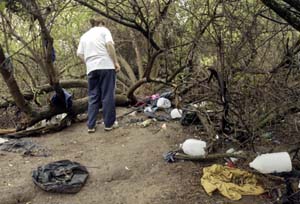

Photos by Aaron J. Latham / Staff
 Laura Elly, a member of the Samaritan Patrol, finds a campsite deserted by entrants. The group, formed by the Rev. John Fife, is carefully watching the upcoming trial of the founder of Border Watch, who is accused of people-smuggling |
ARIZONA DAILY STAR
People offering humanitarian aid to illegal immigrants say their work may be
hampered by the decision to bring border policy foes to trial on criminal charges.
"We're nervous about what it means," said Jennifer Allen, director
of the Border Action Network, a group that advocates for illegal immigrants.
"It makes people think twice before offering assistance when another human
being is in need. That's the implication of targeting people and prosecuting
people for offering assistance."
A federal prosecutor says the charges were not filed for political reasons
but because the defendants were helping people cross the border illegally.
"We don't make a determination to prosecute or not to prosecute based
upon who associates with who," said the prosecutor, U.S. Attorney Paul
Charlton.
In the upcoming trial, Arivaca-based Border Watch founder Miguel Guzman faces
charges that he conspired to smuggle people across the border with group members
Palmanita Fleming of Scottsdale and Pedro Jesus Armenta-Vega of Sonora. Border
Watch is involved in assisting migrants and monitoring law-enforcement activities
along the border west of Nogales.
Fleming pleaded guilty to conspiracy to smuggle and Armenta-Vega told investigators he had been paid to transport illegal entrants, according to an October federal indictment.
The Samaritans group travels the border, providing food, water and medical care to illegal border crossers in need of aid. By Michael Marizco |
The charges stem from a traffic stop by Border Patrol in which agents found
Fleming traveling with five Mexican nationals.
Fleming told an agent she had picked up the illegal entrants for humanitarian
reasons. But some of the illegal crossers told agents they were taken to Guzman's
property that morning and told to lie down in the back where they would not
be seen.
Officers with the state Department of Public Safety stopped Armenta-Vega the
same day on Interstate 10 near Irvington Road. The U.S. Border Patrol was called
because four Mexican nationals were in the car with him.
Armenta-Vega told investigators he had picked up the group of illegal entrants
from a garage on Guzman's property. Documents found in a backpack in the truck
and statements by Armenta-Vega also linked Guzman to the vehicle.
Individuals as well as organizations providing humanitarian aid are also having
second thoughts after learning that Border Watch members are being prosecuted.
When a teen-age girl and her uncle came knocking on Gloria Morales' door in
Douglas asking for help two weeks ago, Morales didn't hesitate to help the illegal
border crossers and care for them before calling the Border Patrol.
Because of the trial, Morales said, she doesn't know if she would do it again.
"In reality, one doesn't know if they're doing right or doing wrong,"
she said. "But what can one do? They needed help."
Morales watched from her home as Aline Delgado Herrera and her uncle Gonzalo
Delgado approached. Morales called the Border Patrol and asked for help, but
none came. Aline's mother had died while crossing with Aline and her uncle from
Mexico. Morales and her husband gave the girl and her uncle sandwiches and water
and called the Border Patrol.
Morales worries for the illegal entrants who cross her property, but she also
worries about staying within the law.
Her concerns are the same for any citizen who wants to help illegal entrants,
said the president of Humane Borders, the Rev. Robin Hoover. "It may prevent
someone from saving a life," he said.
Whether or not the Border Watch members are convicted, prosecuting groups like
these doesn't help clarify for people what they can do, he said.
It's gray area for humanitarian groups patrolling the Arizona desert for illegal
entrants in need of water or medical assistance.
While looking for illegal border crossers in distress west of Arivaca on Tuesday
morning, Dr. Bruce Cairns, a family practitioner and member of Samaritan Patrol,
wondered about his legal standing. He's been stuck with illegal entrants who
have asked him to drive them back to the border. The Samaritans play it safe
in those instances, preferring to call the Border Patrol and let them do the
driving.
The Samaritans keep lawyers on call, Cairns said.
Fears about doing the right thing prompted the Rev. John Fife to form the Samaritans.
Armed with packs of bedsheets, food, bandages and sponges, the Samaritans have
traveled the border desert helping migrants in distress. Doctors are on board
and the group will take people to a hospital if necessary.
"I think that people need to know that it's OK," Fife said. "It's
not only good, it's lawful."
The leader of a group that advocates for tougher border policy views Border Watch differently from humanitarian groups and questioned whether the people-smuggling alleged by prosecutors might be its main mission.
"I'd do all the lying I could, too, to avoid being arrested," said
Wes Bramhall, president of Arizonans for Immigration Control.
* Contact reporter Michael Marizco at 573-4213 or mmarizco@azstarnet.com.